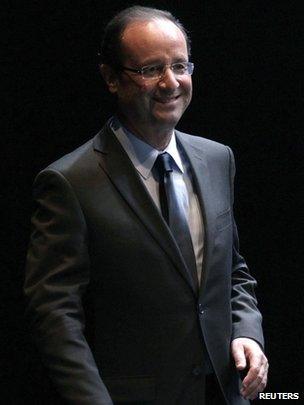Is Hollande enemy or prisoner of finance?
- Published
- comments

Although Francois Hollande began his campaign to be president of France by declaring that his true enemy is "the world of finance", the socialist victor in the first-round of voting is also - to an extent - a prisoner of that world.
The point is that the French government and French economy is disproportionately dependent on the goodwill of overseas investors and banks.
Here are the statistics.
According to IMF figures, 59% of France's government debt is held overseas - which means that well over half of all lending to the French state is not motivated by sentimentality or patriotism in any way.
To put that figure into context, just 24.8% of UK general government debt is provided by foreigners.
Perhaps more relevantly, the French government has to borrow a colossal sum equivalent to 18.2% of GDP this year and 19.5% next year to finance debt that is maturing and the current deficit.
So, to extrapolate from the current ownership pattern of its debt, France needs to retain the goodwill of overseas investors to provide loans equivalent to something like 10% of its GDP this year and a similar amount in 2013.
Again a comparison with the UK may be useful: the UK's financing needs for this year and next are much lower, at 14.8% of GDP and 13.9%, with perhaps no more than 4% of this needing to come from overseas.
And remember that the UK has another huge advantage over France when it comes to financing its deficit: the Bank of England can and has been buying bucket loads of UK government debt; the European Central Bank is prohibited from doing anything remotely comparable.
So, to put it another way, Mr Hollande may believe that big international banks, sovereign wealth funds and hedge funds are the enemy. But if he goes to war with them, there is a risk that they will go on strike and stop lending to the French government.
Which, in a best case, would increase massively what the French government has to pay to borrow. And in a worst case would force France to go cap in hand to the eurozone's bailout funds and the IMF for help.
Also, there is no possibility of Mr Hollande appealing for patriotic help from France's banks: they already own a disproportionate amount of French government debt; and, whenever I speak to French bankers, they chastise the current president Mr Sarkozy as being too anti-capitalist and left wing, so it is doubtful they are feeling well disposed to Mr Hollande.
So does this mean that there is likely to be some great financial cataclysm for France if Mr Hollande is elected?
Well, the opposite may be true.
The logic goes that he must be aware that the French state dare not alienate the international investment community to any great extent.
Which is why many influential investors see Mr Hollande as an intriguing politician with a lot of mouth but not a huge amount in the trouser department. They note, for example, that when he made a flying visit to the UK a few weeks ago, he went out of his way to play down how dangerous he would be to the City of London and international financial businesses.
If there is an investor who knows a thing or two about governments' room for manoeuvre in challenging markets it is the hedge-fund veteran George Soros.
I interviewed Mr Soros yesterday for a new film I am making about the crisis in the eurozone. "Would Mr Hollande force a significant revision to December's fiscal compact that places new constraints on deficits and debts of eurozone governments?" I asked.
I didn't think this was such a dumb question, since such a revision is more than implied by Mr Hollande's rhetoric. But Mr Soros ascribes a minimal probability to Mr Hollande loosening the new fiscal constraints or turning the tide against austerity in Europe.